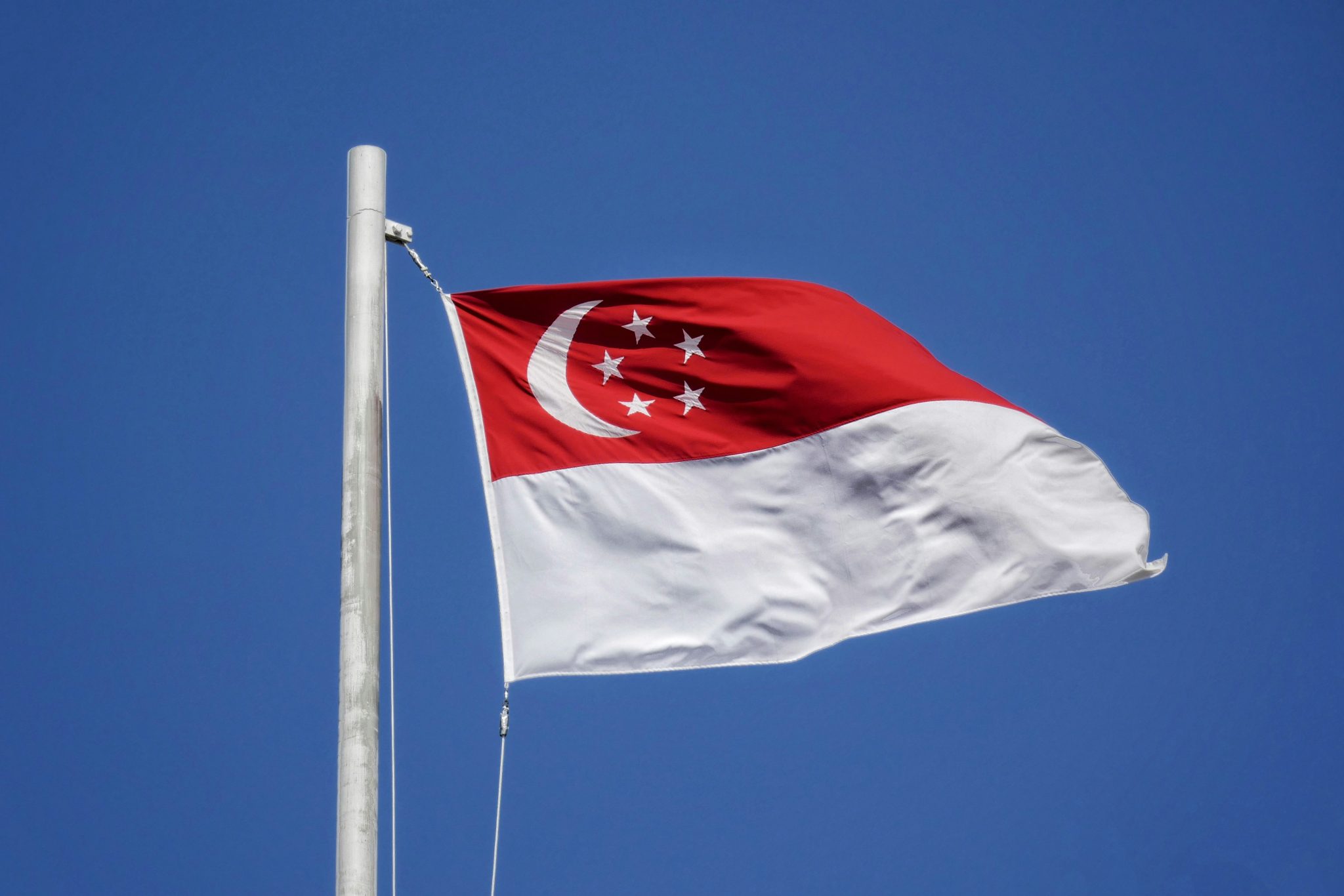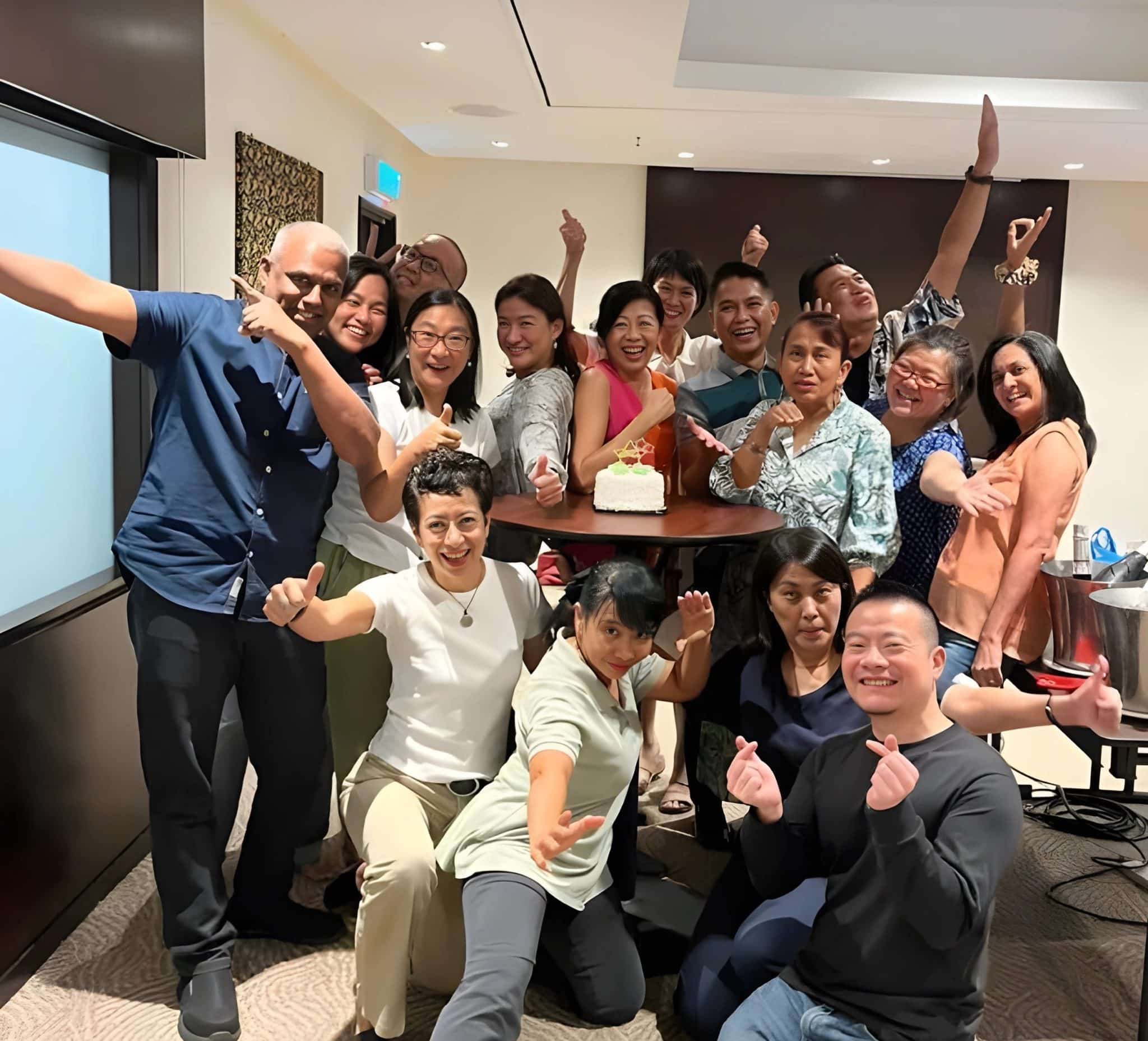From “mom-and-pop clinic” to a voice for migrant workers: Goh Wei Leong takes a farewell look-back (and look-forward) at HealthServe
by Gracia Lee // September 15, 2020, 12:08 am
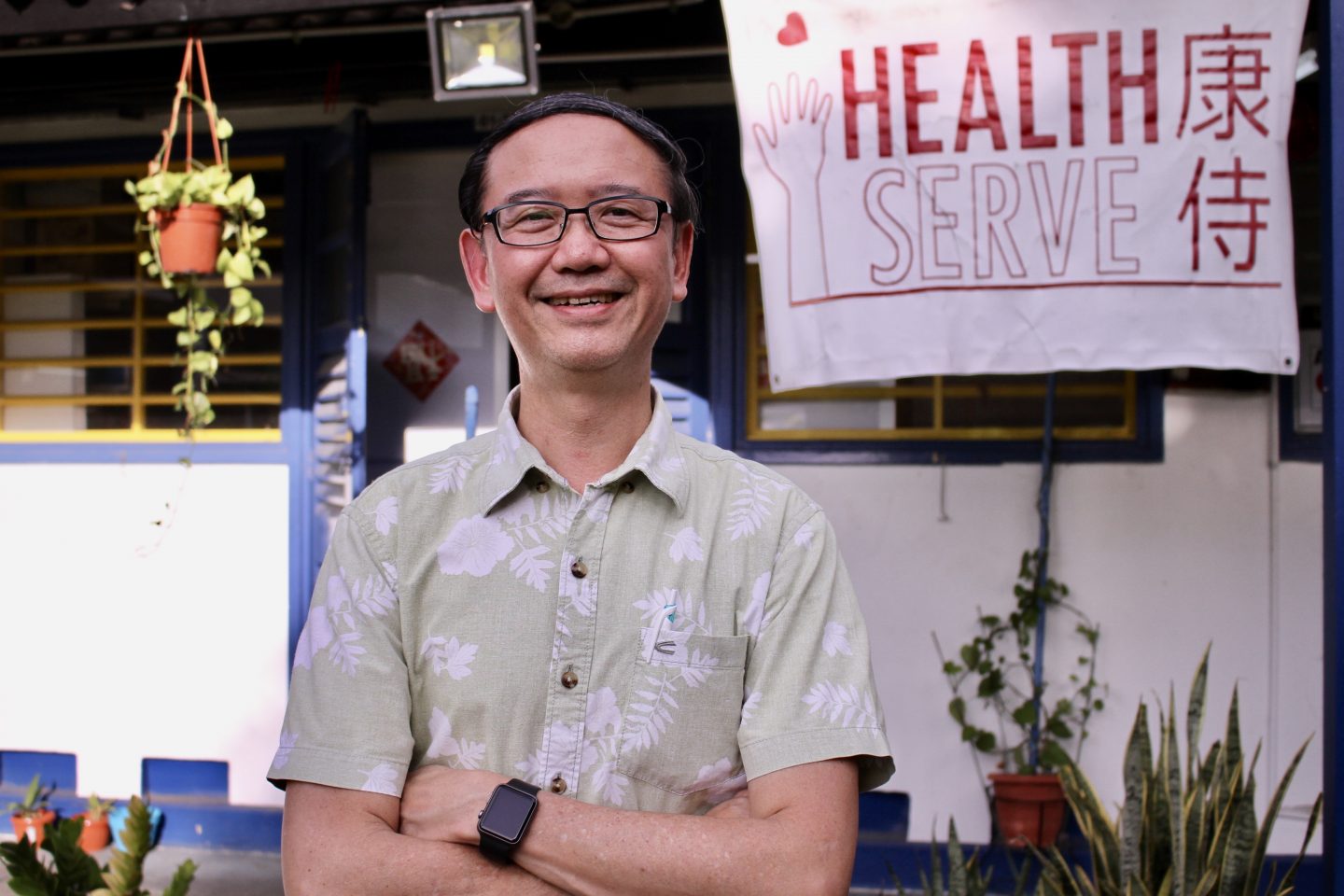
Whenever he's asked what his blueprint was for HealthServe, Dr Goh Wei Leong quips: "Honestly, no blueprint lah. I would say it's only the fingerprints of God." All photos courtesy of HealthServe.
Dr Goh Wei Leong, co-founder and chairman of non-profit HealthServe, has officially stepped down this month after 14 years at the helm.
The 60-year-old, who was named the Singaporean of the Year in 2017, will be passing on the mantle to Chan Chia Lin, who has been working behind-the-scenes at HealthServe for 10 years, first as a volunteer in organisational development and later as a board member who chaired the finance and fund-raising committee.
She is currently also the vice-president of the National Council of Social Services and volunteers with a number of charities and charitable foundations, including Mount Alvernia Hospital and mental health organisation Resilience Collective.
Salt&Light sat down with Dr Goh and Chan to hear more about their time at HealthServe and their plans moving forward.
Dr Goh, why have you decided to step down?
When I first started this with Shin Yong, my co-founder, we’ve always talked about the need for leadership renewal.
“I want to make space for new blood to come in with fresh perspectives and new ideas.”
For me, that was also my own philosophy. I was very cognisant of the problem of Founder’s Syndrome, where a person in leadership has a disproportionate amount of power and influence, hindering the development of the organisation.
The main thing is for me is that I really want to see HealthServe grow. I want to make space for new blood to come in with fresh perspectives, new ideas, new people, new networks, everything new. And I feel that someone like me will have to leave.
How have you seen God’s hand in HealthServe over the past 14 years?
Many people ask me that. They ask: How do you see God’s hand in HealthServe? What was your blueprint for getting HealthServe? I tell them: Honestly, no blueprint lah. I would say it’s only the fingerprints of God.
“There were a lot of struggles, a lot of stumbling, a lot of unknowns. But God really brought us through.”
We really didn’t know what we were doing (when we first started). We were quite naive, really just blur blur go in. I never had these big plans. It was essentially a little clinic, a mom-and-pop thing. We were just moving along, exploring this new space.
Over the years we discovered new areas of service. For example, that for medicine to be holistic, you need to have all the other services – social services, legal advisory – and then we realised that we needed to do research. So, the entire spectrum had to be entered.
Then God brought in different people and different resources. He led us through the different unknowns. There were a lot of struggles, a lot of stumbling, a lot of unknowns. But God really brought us through.
How has the migrant worker scene changed since HealthServe first entered it?
There’s a vast difference from 14 years ago until now. When we first started, very few people were talking about this issue. But people have grown in awareness and the space has suddenly exploded. Covid-19 took it to a new level.
If you look at the migrant worker space today, although there are still the four major non-governmental organisations, look at the number of spontaneous groups that have come up – Migrant x Me, Alliance of Guest Workers Outreach, Project Providence – it’s a lot, right? It’s just amazing.
“Loving somebody unconditionally is part of preaching the Christian Gospel of faith.”
One of the more interesting things is that now the churches are more enlightened, realising that this is part of integral missions, part of our expression as missionaries, as children of God. We do it not just to proselytise, but to live out Christ in us.
But I’m still surprised that even till now, there are some Christian communities that are just discovering for the first time (the opportunity to do) missions right at our doorstep.
I would say that the Christian scene is not easy because it takes a while for the rest of the community to recognise that integral mission is key – doing good works is intimately woven with proclaiming the Good News.
Sometimes it’s difficult for the Church to see the integration of this. They see preaching the Gospel as telling people about the four spiritual laws. But actually, living it out and loving somebody unconditionally is part of preaching the Christian Gospel of faith.
What have been some of your precious takeaways from your time at HealthServe?
The most precious takeaway has been the community – the people, the friendships.
For me, on a personal level, it has really shaped me. I use this word a lot: Ubuntu – “I am because we are”.
“They taught me humility, and that service begins with receiving.”
So, I’m shaped by the very people that I mix with, and they include the entire spectrum – from our generous donors to the professionals who serve us, to the housewives who just come and befriend some of the workers, or the students, interns, and our migrant workers themselves.
They have shaped the way I think and helped me to learn about myself.
I share this story all the time about this migrant worker who wanted to donate a part of his compensation to us. I mean, he was teaching me radical generosity.
I realised that to receive was so much harder than to give. For me to love him as a doctor – easy what – I feel quite good about myself.
But when I received this donation from this migrant worker brother, who had become a believer then, I said I have to come and serve in a posture of humility.
So, they taught me humility, and that service begins with receiving, which was something that was so foreign to me.
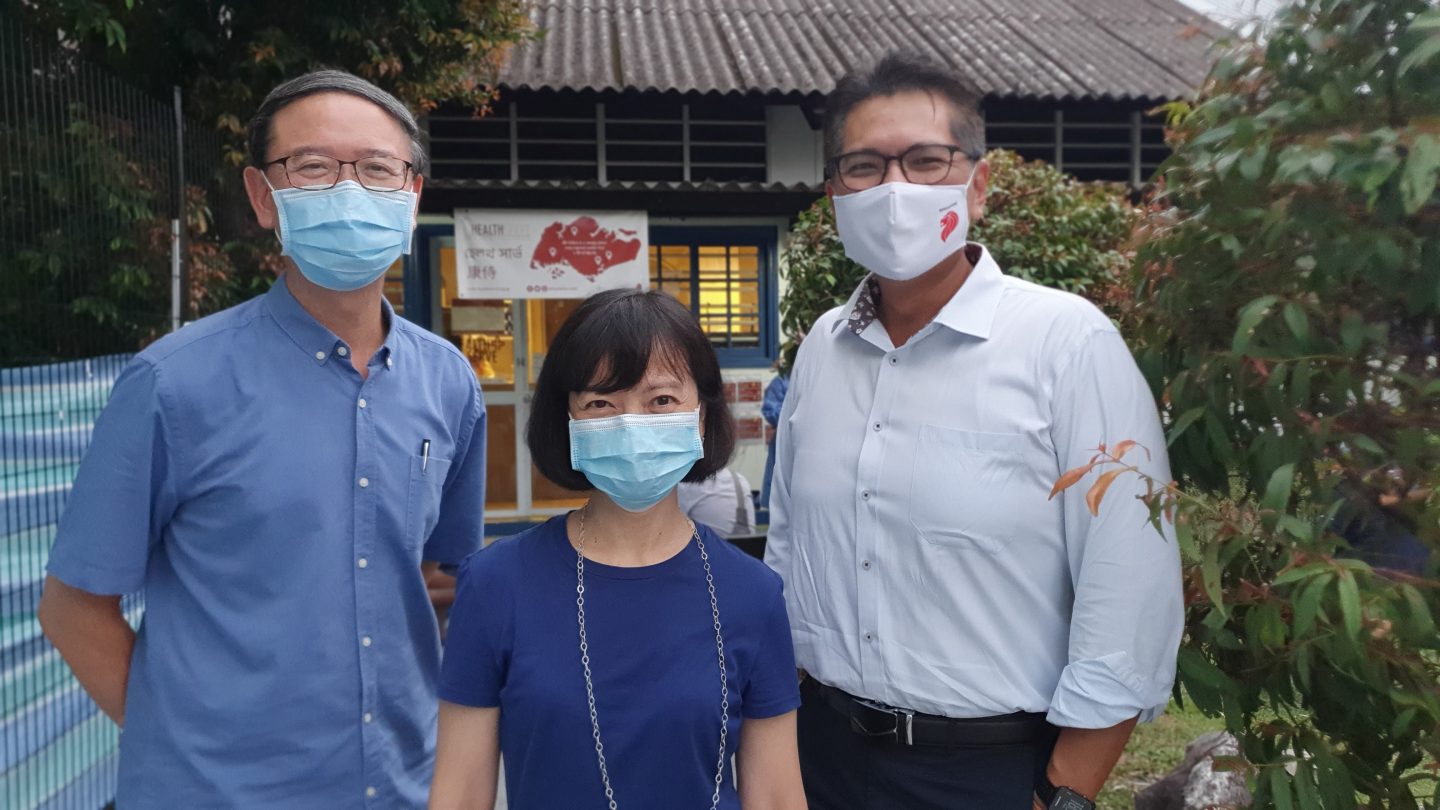
Dr Goh (left) with Chan (middle) and HealthServe’s executive director Michael Cheah.
There was also another worker who had a fractured ankle and was going back without any compensation. He shared that he had come to Singapore poor because he needed a job, but within a short time he was injured, and now he’s being sent home even poorer.
“Before he left, he said that he had lost everything … but found something of surpassing worth.”
His fellow migrant workers shared the Gospel with him, and he came to faith because he was in this community. And before he left, he said that he had lost everything and became poorer, but found something of surpassing worth.
I said: Wah, this guy is barely three months old as a believer, but his spirituality, his depth of understanding and knowledge of God, knowledge of grace, was so deep that I needed to learn from him. His first love of God was so tremendous that it really spurred me on to want a deeper relationship with Christ.
So, I’ve learnt spiritual truths from them, I’ve learnt radical generosity. I’ve also learnt depth of culture, richness of cultural diversity. These are precious takeaways.
How do you hope HealthServe will grow under this new leadership?
Covid-19 has been real proof that the new team can take HealthServe way beyond what I could ever imagine.
“I’ve learnt spiritual truths from (the workers), I’ve learnt radical generosity.”
With Covid-19, we were thrust into something really challenging. But the new team just took off. Honestly, I was in the background praying, and most of the time just thanking God that He’s got a new team there with the expertise that I don’t have.
This is God’s confirmation or answer to me that: Hey, Wei Leong, just celebrate it, man. Enjoy, and leave celebrating. And this is really me leaving, celebrating this amazing feat, this new season that the team has taken us into.
I’m really excited to see how the new leadership will take our DNA into a fresh expression. It’ll be exciting to see the new possibilities, maybe take us to places we’ve never been before. We could be facing new questions – more broad, more diverse.
I’m looking forward to the imagination, creativity, in the new season. I’m very open to how HealthServe will morph into this new organisation who will serve the needs of the times today.
What are your next steps?
I’ve agreed to stay on as an advisor at HealthServe. But I’ll be as hands-off as possible. I’ll be in the background, praying.
“This is God’s confirmation to me that: Hey, Wei Leong, just celebrate it, man. Enjoy, and leave celebrating.”
I’ll probably be the chief celebration officer – come to my house for coffee, party, barbeque. But I’ll definitely want to give Chia Lin and her team the space, because I think that’s the way it should be done.
In October, I’ve planned a three-month modified sabbatical where I’ll take eight days off per month to rest and recalibrate.
Essentially, I’ll go back to explore and relook my personal mission statement – a catalyst bringing life – and the three areas of my own personal interest: Social justice, networking and millennials.
I want to see what that means for me at a global level, a regional level, and even at a church level. I want to take some time to reflect what this fresh expression of my life’s mission statement will mean.
Chia Lin, how do you feel about taking up the mantle from Dr Goh?
It sounds clichéd, but I think I have really big shoes to fill.
Wei Leong has been such an inspiration for all of us here at HealthServe, so I guess it’s with some apprehension that I step up to be the chairman at HealthServe.
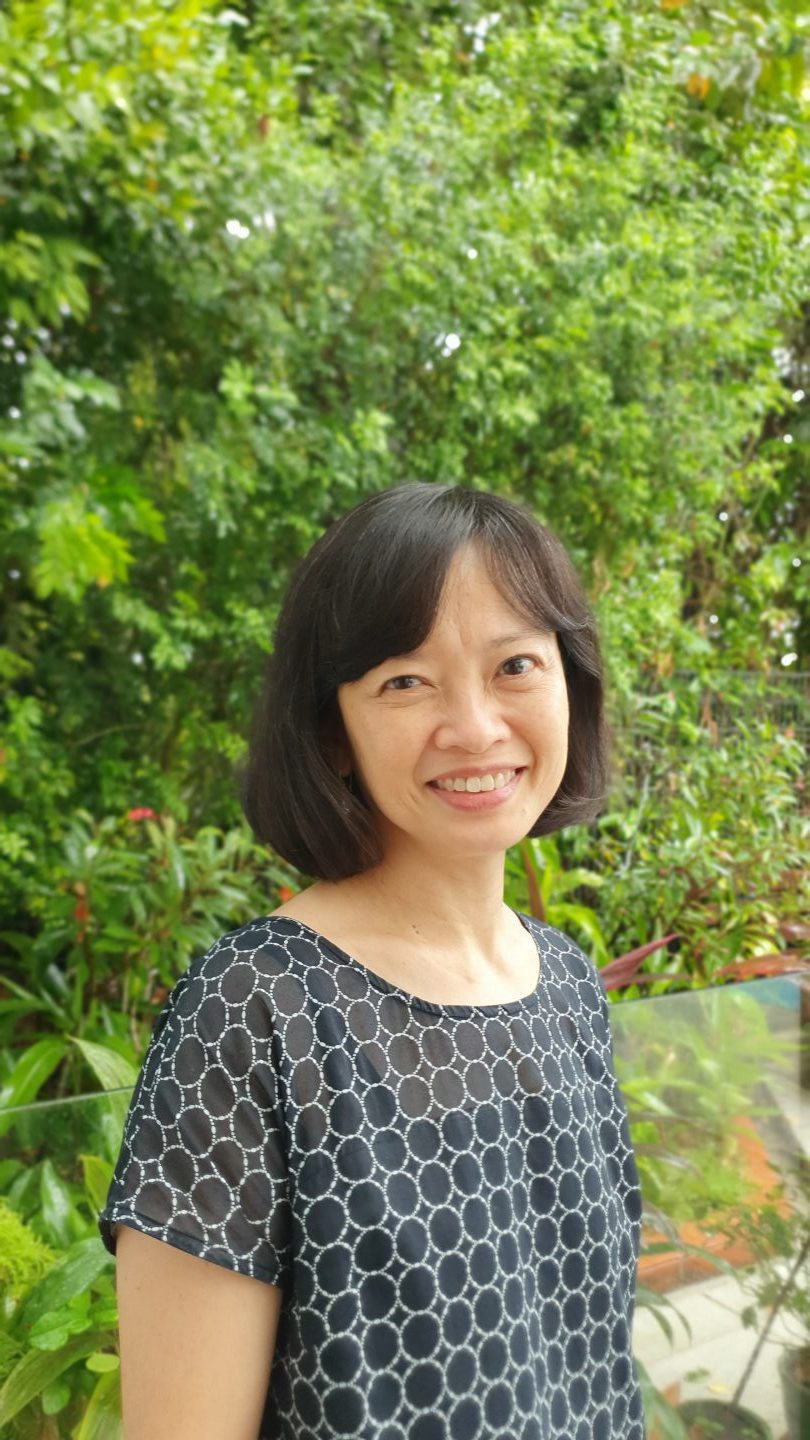
Dr Goh will be succeeded by Chan Chia Lin, who has been on the board of HealthServe for the last six years.
HealthServe today is very different from what it started out as. It’s a much more complex organisation, and the needs today are substantial. So, I feel somewhat challenged about the task ahead.
The greatest challenge for me would be to take on this role with as much faith and as much joy as Wei Leong has had over the last 14 years. He’s always smiling and always joyful. Nothing seems to faze him!
How has Covid-19 surfaced the needs of the migrant worker community?
Firstly, Covid-19 showed us that the need to support the mental health of the migrant worker community is significant.
Before Covid-19, HealthServe had identified mental health support as a significant area of need. So in 2019, the board approved the first comprehensive mental health programme for HealthServe and the community.
We hired a small team of just two people to get us going on this mental health support programme. It seemed like a fairly natural extension beyond our medical services.
“The greatest challenge for me would be to take on this role with as much faith and as much joy as Wei Leong had.”
We never expected Covid-19. This really was God’s timing because we’ve seen that mental stress amongst the workers has been heightened in the last three months.
Covid-19 has also thrown up the need to care for the workers’ chronic diseases.
Many migrant workers who have chronic diseases like diabetes and high blood pressure don’t dare to go to the company doctor or to their employer for reimbursement because of the deep fear of being sent home.
So, they either ignore the problem or rely on family back home to send them the medication. But with Covid-19, the logistics broke down.
In the hospitals and isolation facilities, we also found that some of them had chronic diseases which they didn’t know they had. After they’ve recovered from Covid-19 and are discharged, who’s going to help look after these workers?
How has Covid-19 changed the way HealthServe is run?
While Covid-19 showed us more starkly where the needs are, it has also shown us what’s possible through technology.
When the Ministry of Health ruled that doctors could only work at one place to prevent cross-infections, our volunteer pool of medically trained volunteers shrank from 100 to 10. There was a scramble.
But then we resorted to technology, which saw us roll out the first hybrid telemedicine for HealthServe. We had interns and volunteer medical students at our clinic in Geylang, and a volunteer doctor over video conferencing.
That’s when we first thought: Hey, we can scale up!
We also harnessed technology to communicate information about hygiene and safe distancing to the workers in their languages, and rolled out a chatbot for workers to reach out if they needed help.
And we realised that we could reach out to, not hundreds, not thousands of workers, but potentially tens of thousands and hundreds of thousands of workers.
What will the next season of HealthServe look like?
The next season of HealthServe will be about combining our high-touch strategy, where we serve the most vulnerable workers, with a high-reach strategy.
This means we reach out to the larger migrant worker community through technology to provide information, education, online resources to support mental health and chronic diseases.
“What is the heart, what is the soul, what is the DNA of HealthServe? We are a community, we are God’s family.”
These may be workers who may not be most distressed, but who would still benefit from such information. This also helps to increase awareness about us so that the workers will know where to go if they have a problem.
Over the last 14 years we’ve seen, as Wei Leong said just now, God’s fingerprints, God’s hand, in the growth of HealthServe all these years. I think then we have to approach this very ambitious project that we have ahead of us with much faith, to really approach it in prayer.
The challenge is for us to constantly ask ourselves: What is the heart, what is the soul, what is the DNA of HealthServe? We are a community, we are God’s family.
We must always remember that personal touch, whether it’s in serving our migrant brothers, or just that interaction within the community of volunteers, interns, staff and board. That is something we have to constantly remind ourselves not to lose.
“Singaporeans need to learn to live with mess!”: 2017 Singaporean of the Year Dr Goh Wei Leong
We are an independent, non-profit organisation that relies on the generosity of our readers, such as yourself, to continue serving the kingdom. Every dollar donated goes directly back into our editorial coverage.
Would you consider partnering with us in our kingdom work by supporting us financially, either as a one-off donation, or a recurring pledge?
Support Salt&Light